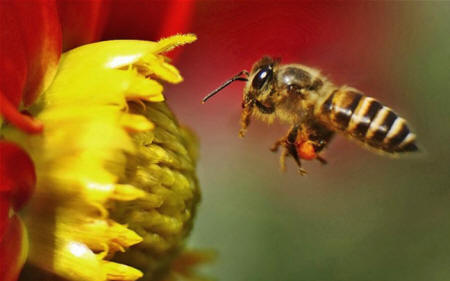|
Is it a little to late?
It seems that we've known for years that pesticides are killing millions of bees, if not billions.
More specifically, it's neonicotinoid pesticides that have been targeted as the culprit, and the province of Ontario, Canada is doing something about it. Ontario's government recently made the decision that neonicotinoid pesticide use will be reduced by 80 percent no later than 2017.
Neonicotinoid insecticides persist in very high levels in planter exhaust material produced during the planting of crops treated with these insecticides.
This runs contrary to industry claims that the chemicals biodegrade and are not a threat, they lied. These pesticide components are found in soil, they are also found in fields where the chemicals are not even sprayed.
Bees also actively transfer contaminated pollen from primarily pesticide treated corn crops and bring it back to their hives.
Furthermore, bees transfer these pesticides to other plants and crops that are not treated with the chemicals, which goes to show just how persistent these chemicals truly are in the environment.
As CBC news reports:
Ontario's Environmental Commissioner Gord Miller recently made an appearance on the Canadian Broadcast Corporation news network stating that:
The federal government is currently in the process of studying the effects of three of the pesticides on bee colonies in agricultural areas.
The study is currently underway and has not been completed, but environmental groups across Ontario are urging the government to act before the study is completed.
The Ontario Beekeepers Association determined that bee deaths reached a record high last winter (this seems to happen every year all over the world where the pesticides are applied) in Ontario, which is more than three times the average compared to all other Canadian provinces. (source) (source)
I have not looked into the numbers in the UK since 2013, but in that year the UK also recorded a record high.
You can read that article here.
It's odd that this information is just coming to light within the mainstream, and that the provincial government is just now considering taking action when this information has been known about for years.
For example, a new study out of Harvard University, published in the June edition of the Bulletin of Insectology puts the nail in the coffin,
FYI, neonicotinoid's are the world's most widely used insecticides. (source)
A paper published in the journal Nature discusses how bees are twice as likely to die when exposed to pesticides; two-thirds of the bees are lost when exposed compared to a third when not exposed. The exposed bees are also half as successful in gathering food. (source)
Scientists from the US Department of Agriculture as well as the University of Maryland published a study that linked chemicals, including fungicides, to the large scale die-off of bees that has recently plagued the planet, you can read that study as well. (source)
It's not just bees, it's other insects (not to mention the effects on human health as well as the environment) like Monarch butterflies, you can read more about that here.
Alarming bee losses have also been recorded in various parts of the world where these pesticides are sprayed, they are dying by the hundreds of millions.
|

